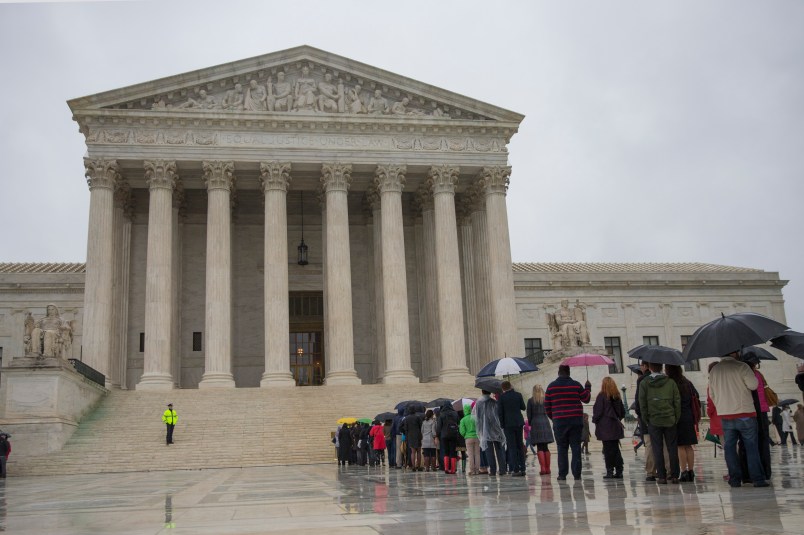WASHINGTON (AP) — The Supreme Court dealt a blow to public sector unions Monday, ruling that thousands of home health care workers in Illinois cannot be required to pay fees that help cover a union’s costs of collective bargaining.
In a 5-4 split along ideological lines, the justices said the practice violates the First Amendment rights of nonmembers who disagree with the positions that unions take.
The ruling is a setback for labor unions that have bolstered their ranks and their bank accounts in Illinois and other states by signing up hundreds of thousands of in-home care workers. It could lead to an exodus of members who will have little incentive to pay dues if nonmembers don’t have to share the burden of unioncosts.
But the ruling was limited to “partial-public employees” and stopped short of overturning decades of practice that has generally allowed public sector unions of teachers, firefighters and other government workers to pass through their representation costs to nonmembers.
Writing for the court, Justice Samuel Alito said home care workers “are different from full-fledged public employees” because they work primarily for their disabled or elderly customers and do not have most of the rights and benefits of state employees. The ruling does not affect private sector workers.
The case involves about 26,000 Illinois workers who provide home care for disabled people and are paid with Medicaid funds administered by the state. In 2003, the state passed a measure deeming the workers state employees eligible for collective bargaining.
A majority of the workers then selected the Service Employees International Union to negotiate with the state to increase wages, improve health benefits and set up training programs. Those workers who chose not to join theunion had to pay proportional “fair share” fees to cover collective bargaining and other administration costs.
A group of workers led by Pamela Harris — a home health aide who cares for her disabled son at home — filed a lawsuit arguing the fees violate the First Amendment. Backed by the National Right to Work Legal Defense Foundation, the workers said it wasn’t fair to make someone pay fees to a group that takes positions the fee-payer disagrees with.
The workers argue they are not government employees capable of being unionized in the traditional sense. They are different, they say, because they work in people’s homes, not on government property, and are not supervised by other state employees. And they say the union is not merely seeking higher wages, but making a political push for expansion of Medicaid payments.
Alito agreed, saying “it is impossible to argue that the level of Medicaid funding (or, for that matter, state spending for employee benefits in general) is not a matter of great public concern.”
The workers had urged the justices to go even farther and overturn a 1977 Supreme Court decision which held that public employees who choose not to join a union can still be required to pay representation fees, as long as those fees don’t go toward political purposes. About half of the states require these fair-share fees.
Alito said the court was not overturning that case, Abood v. Detroit Board of Education, which is confined “to full-fledged state employees.” But he said that extending Abood to include “partial-public employees, quasi-public employees, or simply private employees would invite problems.”
Justice Elena Kagan wrote the dissent for the four liberal justices. Kagan said the majority’s decision to leave the older case in place is “cause for satisfaction, though hardly applause.”
Kagan agreed with the state’s arguments that home care workers should be treated the same as other public workers because Illinois sets their salaries, resolves disputes over pay, conducts performance reviews and enforces the terms of employment contracts.
“Our decisions have long afforded government entities broad latitude to manage their workforces, even when that affects speech they could not regulate in other contexts,” Kagan said.
Harris issued a statement through the National Right to Work Foundation praising the decision.
“Families in Illinois can relax knowing their homes are safe from being a union workplace and there will be no third party intruding into the care we provide our disabled sons and daughters,” Harris said.
Still, the court’s limited ruling means public unions avoided a potentially devastating blow that could have meant a major drop in public employee membership ranks.
Mary Kay Henry, president of the SEIU, said her union would work with Illinois officials to create a new model for “working together to create good jobs and improve the quality of care that we deliver to seniors and the disabled.”
Henry said it was not clear how the decision would affect home care union models in other states, where theunion represents 400,000 caregivers.
A federal district court and the 7th U.S. Circuit Court of Appeals had rejected the lawsuit, citing the high court’sprecedent.
At least nine other states have allowed home care workers to join unions: California, Connecticut, Maryland, Massachusetts, Minnesota, Missouri, Oregon, Vermont and Washington.
Copyright 2014 The Associated Press. All rights reserved. This material may not be published, broadcast, rewritten or redistributed.
Read the opinion here:
Copyright 2014 The Associated Press. All rights reserved. This material may not be published, broadcast, rewritten or redistributed.







It’s a poorly thought-out and terrible decision, but it could have been a great deal worse.
Hobby Lobby wins! It’s a good day for America.
Far-right religious nuts win—America loses.
May you get a job with a corporation run by Muslims who insist that you turn toward Mecca and pray five times a day during work hours.
Yet the nonmembers are still entitled to be defended by the union when facing disciplinary action, they still have benefits, conditions, and salary negotiated for them, and get all of this for nothing.
This is personal responsibility?
Change the law. Unions shouldn’t have to work on behalf of the free riding whiny leeches.